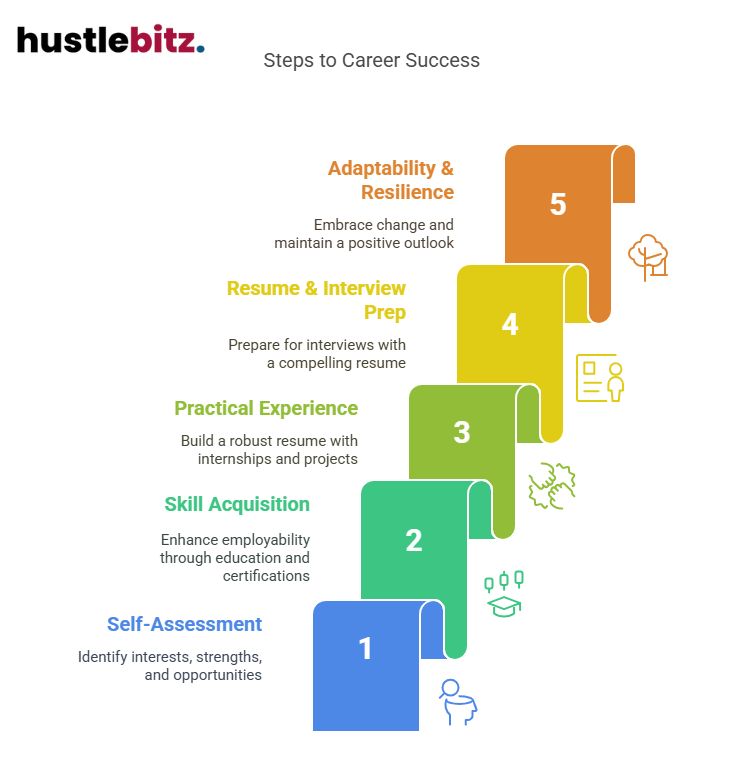Building a successful career from scratch involves several essential steps. Begin with self-assessment to clarify your interests and strengths. Next, acquire relevant skills through online courses and certifications to enhance your employability. Gaining practical experience is crucial, whether through internships, volunteer work, or side projects. A strong resume that highlights your achievements will set you apart. Prepare for interviews by practicing responses and refining your presentation skills. Lastly, maintaining adaptability and resilience will help you navigate challenges. These foundational steps pave the way for long-term success, revealing additional insights on enhancing your career trajectory.
Key Takeaways
- Conduct thorough self-assessment to identify your interests, strengths, and market opportunities that align with potential career paths.
- Acquire relevant skills through online courses, mentorship, and industry certifications to enhance employability and expertise.
- Gain practical experience via internships, volunteer work, and side projects to build a robust resume and professional network.
- Create a compelling resume and prepare for interviews by practicing common questions and refining your body language.
- Stay adaptable and resilient by embracing change, seeking ongoing education, and maintaining a positive outlook throughout your career journey.

Assess Your Interests

To build a successful career, it is essential to first assess your interests, as understanding what genuinely motivates you can guide your professional choices and foster long-term fulfillment.
The initial phase of this journey involves passion exploration, where you delve into activities and fields that resonate with your intrinsic motivations. Engaging in a thorough personality assessment can further clarify your strengths and preferences, allowing you to align your career path with your unique attributes.
Once you have a clearer understanding of your interests and personality traits, conducting market research becomes vital. This involves analyzing industry trends, job prospects, and the skills required to thrive in your chosen field. Such research will not only inform your decisions but also highlight potential opportunities that align with your passions.
As you continue to refine your career aspirations, developing effective networking strategies is crucial. Building connections with professionals in your areas of interest can provide invaluable insights and open doors to opportunities that may not be readily apparent. Networking allows you to engage with mentors who can guide you and offer advice tailored to your goals.
Acquire Relevant Skills

Acquiring relevant skills is a critical step in bridging the gap between your interests and the demands of your chosen career path. A well-rounded skill set not only enhances your employability but also positions you as a competitive candidate in a constantly evolving job market. To achieve mastery, consider engaging in various avenues for skill acquisition.
Utilizing online courses is a powerful method to gain specialized knowledge at your own pace. These platforms offer a myriad of topics tailored to industry needs, allowing you to focus on areas that resonate with your career aspirations. In addition, seek mentorship opportunities; seasoned professionals can provide invaluable insights and guidance, helping you navigate your development effectively.
Furthermore, adopting strategic networking strategies can open doors to collaborations and partnerships that enrich your expertise. Attend relevant industry conferences or join professional organizations to connect with like-minded individuals. Regular skill assessments are crucial to identify areas for improvement and ensure you remain at the forefront of your field.
Lastly, obtaining industry certifications can further validate your skills, making you more appealing to potential employers. Below is a summary of these strategies:
| Strategy | Description | Benefits |
| Online Courses | Flexible learning on specialized topics | Self-paced knowledge acquisition |
| Mentorship Opportunities | Guidance from experienced professionals | Personalized career advice |
| Networking Strategies | Building professional relationships | Expanding opportunities |
Gain Practical Experience

Gaining practical experience is essential for translating theoretical knowledge into real-world application within your chosen field. Engaging in hands-on experiences not only enhances your skill set but also builds your professional network, which is crucial for career advancement. By actively seeking opportunities, you can immerse yourself in environments that foster growth and learning.
Consider the following avenues to gain practical experience:
- Internship Opportunities: These provide invaluable insights into industry standards and practices, allowing you to apply your academic learning in a professional context. Internships can often lead to full-time positions, making them a critical step in your career journey.
- Volunteer Positions: Offering your skills for free can yield significant returns. Volunteering not only enriches your resume but also demonstrates your commitment and passion for your field. It allows you to gain experience while contributing to meaningful causes.
- Mentorship Programs: Establishing relationships with experienced professionals can facilitate personal and professional growth. Mentors can provide guidance, share insights from their own experiences, and introduce you to key networking events.
In addition to these formal avenues, consider undertaking side projects. These initiatives can showcase your creativity and initiative, making you stand out to potential employers.
Create a Strong Resume
Developing a compelling resume is vital for effectively showcasing the practical experience and skills you have accumulated throughout your career journey. A well-structured resume not only captures attention but also conveys your value proposition to potential employers. To achieve this, careful resume formatting is essential. Use a clean, professional layout that enhances readability, ensuring that key information stands out.
Incorporating a professional summary at the beginning of your resume can succinctly outline your career objectives and highlight your unique qualifications. This section should be strategically crafted to reflect your aspirations while aligning with the needs of the employer.
To further enhance your resume, keyword optimization is crucial. By integrating industry-specific terms and phrases from the job description, you increase the likelihood of passing through Applicant Tracking Systems, thereby making your application more visible.
Moreover, emphasize your quantifiable achievements throughout your professional history. Instead of vague descriptions, provide concrete examples that demonstrate your impact, such as percentage increases in sales or successful project completions. This data-driven approach not only substantiates your skills but also differentiates you from other candidates.
Prepare for Interviews
Mastering interview preparation is essential for presenting yourself effectively and confidently to potential employers. A well-structured approach to interviews not only showcases your qualifications but also reflects your professionalism. To excel, consider the following strategies:
- Practice Common Questions: Familiarize yourself with frequently asked interview questions. This enables you to articulate your experiences and skills clearly, highlighting your fit for the role.
- Refine Your Body Language: Non-verbal communication plays a pivotal role in interviews. Maintain eye contact, offer a firm handshake, and adopt an open posture to convey confidence and engagement.
- Engage in Mock Interviews: Conducting mock interviews with peers or mentors can significantly enhance your performance. This practice helps you receive constructive feedback and reduces anxiety.
In addition to these techniques, it’s vital to develop robust follow-up strategies post-interview. Sending a thoughtful thank-you email not only reinforces your interest in the position but also provides an opportunity to reiterate key points discussed during the interview.
Stay Adaptable and Resilient

Adaptability and resilience are crucial traits that empower individuals to navigate the ever-evolving landscape of their careers effectively. In a world characterized by rapid change, the ability to embrace change is essential for professionals seeking to thrive. This necessitates a mindset that not only welcomes new opportunities but also actively seeks them out, recognizing that every transition can lead to growth and innovation.
To remain competitive, one must learn continuously. This commitment to ongoing education—whether through formal coursework, workshops, or self-directed study—ensures that you are equipped with the latest skills and knowledge relevant to your field. Such diligence not only enhances your expertise but also positions you as a thought leader among peers.
Managing setbacks is an inevitable aspect of any career journey. Resilience involves viewing challenges as opportunities for learning rather than insurmountable obstacles. By reframing failures, individuals can extract valuable lessons, fostering a growth mindset that propels them forward.
Furthermore, cultivating relationships is vital in building a robust professional network. Engaging with mentors, peers, and industry leaders provides support and insight, facilitating collaboration and knowledge exchange that can open doors to new opportunities.
Lastly, maintaining positivity in the face of adversity is essential. A positive outlook not only enhances personal well-being but also influences those around you, creating a supportive environment conducive to innovation and success. By embodying these principles, individuals can forge a successful career path characterized by adaptability and resilience.
Final Thoughts
Building a successful career from scratch requires dedication, adaptability, and strategic planning. By assessing your interests, acquiring relevant skills, and gaining practical experience, you can lay a solid foundation for your professional growth. Crafting a strong resume, preparing for interviews, and maintaining resilience in the face of challenges are key to navigating the evolving workforce. Stay open to continuous learning and embrace change, as these will help you overcome setbacks and seize new opportunities. With a clear focus on your goals and a commitment to personal development, you can successfully shape a fulfilling and long-lasting career.




